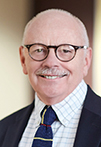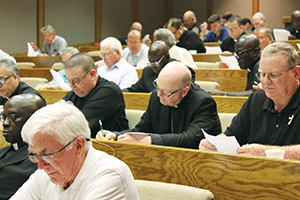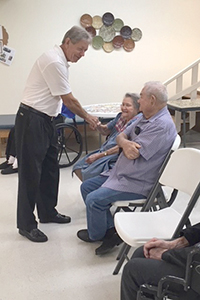Goal is to equip them to better support, educate parishioners
By JULIE MINDA
Dying is a physical and spiritual experience, so it is no surprise that Catholics facing end-of-life care decisions for themselves or a loved one may seek advice from a physician as well as a member of the clergy.

Fr. Bouchard
But survey research has shown that even doctors may be uncomfortable talking to their patients about death. According to Fr. Charles Bouchard, OP, Catholic clergy members also may feel uneasy with the topic, especially if they don't fully understand the church's nuanced position that an individual patient holds great sway in determining when care is overzealous and disproportionate, and hospice care is the best option.
Fr. Bouchard said Catholic priests have the opportunity to use the influence of the pulpit to encourage parishioners to write advance care plans before the onset of serious illness, traumatic injury or advanced cognitive decline. To encourage them to do so, CHA is offering to present a workshop in dioceses around the U.S. The initiative is part of a CHA effort to be a resource to the church on health care topics, and it addresses a strategic objective to build stronger relationships with U.S. dioceses, the United States Conference of Catholic Bishops and the Holy See.
Bishop Brendan J. Cahill, leader of the Diocese of Victoria, Texas, was the first to invite CHA to present the workshop on pastoral and ethical issues surrounding end-of-life care.

Clergy from the Catholic Diocese of Victoria in eastern Texas take part in an April workshop on Catholic ethics and end-of-life care. CHA ethics experts presenting the session encouraged the priests and deacons to talk to parishioners about the importance of writing an advance care plan before the onset of serious or terminal illness.
Upward of 70 priests, deacons and other clergy took part in the April 18 meeting at Holy Family of Joseph, Mary and Jesus Catholic Church in Victoria. The diocese spans 10 counties between Houston and Corpus Christi. Nearly 104,000 Catholics are registered in its 50 parishes.
Co-led by Fr. Bouchard, CHA's senior director of theology and ethics, and Nate Hibner, CHA director of ethics, the course provided an overview of Catholic directives on end-of-life care as well as guidance on how to preach about the topic of advanced care planning and offer support to people making health care decisions for themselves or a loved one. They presented on the same topic at St. Mary's Seminary in Houston on April 19.
Fr. Bouchard said it is important for clergy to feel comfortable speaking to parishioners about end-of-life topics because these conversations can provide spiritual guidance and ease anxiety and suffering. There is an added incentive to address the issue now as state-based efforts to legitimize and legalize physician-assisted suicide spread. Clergy can support the church in its opposition to those initiatives by explaining that Catholic theology offers the foundation for a happy, hope-filled, peaceful death, Fr. Bouchard said. "And, for us, assisted suicide is not a happy death."
Weighty topics
At the workshop, Hibner reviewed the Ethical and Religious Directives for Catholic Health Care Services, with a focus on Part Five, "Issues in Care for the Seriously Ill and Dying." He explained Catholic principles that should influence discernment around what constitutes ordinary and extraordinary means of preserving life and appropriate levels of treatment.
The directive emphasizes the need for health care providers to ensure that patients have access to palliative care that addresses their spiritual and physical pain. At the heart of the church's principles on end-of-life care is the concept of respect for human dignity, he said.
Fr. Bouchard offered instruction on writing a homily that connects the topic of end-of-life care to the scriptural passages on any given day.
Fr. Bouchard reminded workshop participants that news events can provide an entrée into homily topics. A day before the workshop, former first lady Barbara Bush had died in her home in the Houston area — about 130 miles from Victoria. Media outlets reported that days before her death the 92-year-old Bush, who'd had congestive heart failure and chronic obstructive pulmonary disease, had declined aggressive medical care, opting for comfort care.
The news sparked media coverage about palliative and hospice care. Fr. Bouchard saw it as a preaching opportunity too. "We have to look for cues in things happening around us (when developing our homilies). People are wondering what's the church's teaching on these topics," he said.

Deacon Dennis Kutach, who works with four Yoakum, Texas-area parishes, visits with residents Bessie Staehr and Steve Chomout at Stevens Health Care & Rehab Center in Yoakum. Kutach says information he gained as a participant in the end-of-life care workshop will benefit him in his ministry.
Myth busters
Course content focused on the importance of communication, education and preparation. Fr. Bouchard encouraged conference attendees to stress to parishioners that the best time to think deeply about and communicate one's wishes is well in advance of a health crisis. Hibner explained that preparing in advance for difficult end-of-life decisions can avert family conflicts over medical care when a loved one is nearing death.
Fr. Bouchard and Hibner also discussed in the workshop the importance of dispelling myths. They said it is a misconception that that the Catholic Church requires Catholics to say yes to all medical interventions, including therapies that have little or no benefit. Each individual patient, in consultation with his or her clinicians, can and should determine if and when the burdens of a treatment outweigh its benefits, Fr. Bouchard said.
Ready to be a resource
Deacon Dennis Kutach is a liaison between Bishop Cahill and the deacons in the Victoria diocese. He said he came to the CHA workshop with little grasp of the church's guidance on end-of-life care issues. But, he said, he now has a good understanding of the fundamentals.
Kutach is the only deacon for four Yoakum-area parishes. He teaches Rite of Christian Initiation of Adults classes, where group discussions include the Catholic perspective on social issues. He also visits and takes communion to homebound and hospitalized parishioners. He said the information he gained in the workshop will be valuable in those contexts. He expects to draw on it in informal conversations with friends and acquaintances who turn to him as a resource when they have questions about the church's position on issues.
He said, "It's imperative for me to know about these issues and be confident about them. … This workshop made me realize there's more I need to do to continue to educate myself."
He said he'll stress to parishioners, "If you don't know what the church's position is, don't assume. Do your research on what the teachings are. Learn and form your conscience." And, he now can help them do that.
Copyright © 2018 by the Catholic Health Association
of the United States
For reprint permission, contact Betty Crosby or call (314) 253-3490.